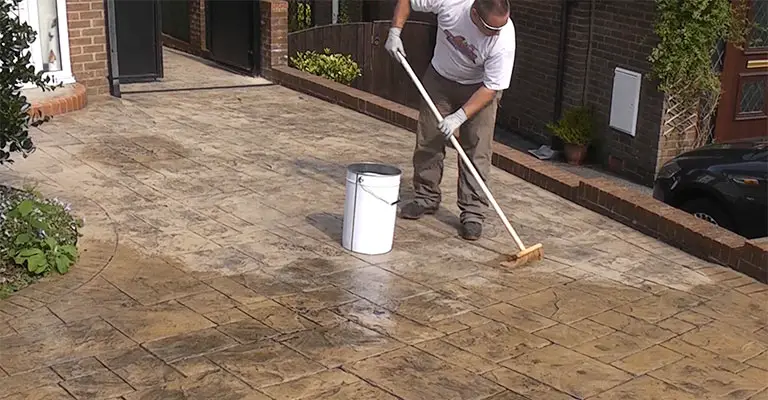For your concrete flooring to remain protected and preserved, you should reseal it every 2-5 years. Many factors can influence how long it takes for sealants to dry between applications.
Therefore, a floor’s endurance between applications can only be gauged by its owner. Please consider where you want to place your concrete and how you plan to use it.
For example, does it face traffic, sit on a sidewalk, patio, or in a finished basement? Does your garage, shed, or work room store heavy equipment and caustic chemicals, exposing your concrete to additional dangers?
It may be necessary to seal more often if this is the case. The frequency of resealing a concrete driveway varies depending on who you ask. Also, note that acrylic sealers typically last one to three years.
Likewise, the lifespan of a slab varies depending on the product used, the weather, and the amount of wear and tear it has incurred.
The quality of the resin greatly influences seal coat longevity in the sealer. According to concrete trade, organizations like Concrete Network plan to reseal concrete every year.
Does Concrete Need to Be Sealed?

There is no need to seal concrete because concrete is durable enough to last for quite a while without sealing. Concrete sealer, however, does protect concrete from fading and cracking by preventing it from cracking.
Sealants also add a glossy sheen to concrete surfaces while protecting them from unsightly stains, boosting the appeal of your concrete driveway or patio.
What Is Concrete Sealant?
The most common concrete sealants are epoxy, polyurethane, or penetrating resins. The most economical sealant is acrylic, which is available at various price points.
Using acrylic sealants requires more frequent application, but they protect the surface effectively. As a result, they allow concrete to “breathe” and will not trap water vapor inside the concrete, where it can cause damage.
Since they have more traction, you, your friends, and your family will be less likely to slip and fall with acrylic sealants.
There will be a greater degree of inclusiveness with polyurethane and resin sealers. However, where you live, they might cause cracks or moisture damage. Concrete sealants that penetrate concrete are much more expensive.
Professional application is recommended for best results. It creates a chemical barrier that protects against moisture, as the term implies, by penetrating the concrete.
How Long Does A Concrete Sealer Last?

No matter what type of concrete floor you have, whether it is stamped concrete, decorative concrete, or a simple concrete floor in your garage, basement, or patio, sealing your floor will ensure that it lasts over time and looks great.
The process of sealing your concrete is relatively easy and inexpensive. Keeping your concrete floor in good shape is possible by sealing it every two to five years, as recommended by experts, preventing cracks, pitting, and further damage.
Your local climate can also damage concrete. Your concrete floor’s life will be impacted by exposure to intense weather. Hot deserts, oppressive humidity, and bitter cold are examples of this type of weather.
The porous nature of concrete can lead to cracks and degradation when it freezes and thaws. Therefore, you should seal your concrete floors, driveways, and other surfaces to ensure they last a long time.
Should I Seal My Concrete Driveway?

Several factors influence whether or not you should seal your concrete driveway. First, installing a sealant on a concrete driveway can be a pain since it prevents cracks and fades, but it can also extend its life.
Applying a sealer every few years is necessary because it wears away. The sealer can crack and peel once it begins to wear, resulting in an unsightly driveway.
A driveway or patio can also be time-consuming and costly to seal. In addition, sealers are hazardous to work with because they use dangerous solvents.
Do I Need to Seal My Fresh Concrete Driveway?
Keeping your concrete driveway pristine looking can be accomplished by sealing it, but it’s unnecessary. As a standalone material, concrete is quite durable.
However, you’ll need to wait a while when you want to seal a new concrete driveway. Approximately 30 days are required to dry new concrete fully.
To ensure that the concrete dries to its full strength, you must wait for it to cure fully. Otherwise, moisture might be sealed into the concrete, preventing it from drying.
How Do You Know When To Seal Concrete?

After penetrating sealer is applied, the concrete will not appear differently. However, it will bead when water is poured on top of it. Therefore, resealing your concrete is the best test you can do to determine if it needs to be resealed.
How Often Should You Seal Concrete Driveway?
Concrete sealers are more durable than asphalt sealers, which must be reapplied every one to three years. Therefore, approximately every five years, you will need to reseal your concrete driveway.
You may need to reseal your driveway more frequently if you live in a colder region. Check your driveway’s surface for signs of porousness or wear to determine if it needs resealing.
How Much Does It Cost to Seal a Concrete Driveway?
Depending on the sealer’s quality, a 5-gallon container of penetrating sealer for concrete costs about $100. However, for a 5-gallon container of some products, the cost can be as high as $200.
Consider the lifespan of more expensive products before running out and purchasing a cheaper alternative. The longer the product lasts, the more often it will need to be resealed.
Five gallons of sealant is sufficient for 500 square feet of driveway; however, if the driveway is very porous, you may only get half that amount.
The amount of sealant needed to reseal a driveway will be substantially less once it has been sealed.
However, it is essential to remember that most concrete sealers are sprayed on. Therefore, renting one is an additional expense you’ll have to consider if you don’t have one.
How to Reseal Stamped Concrete?

To reseal, it’s best to use the same sealer as the original. Make sure that water-based sealers are kept with water-based sealers or solvent sealers are kept with solvent sealers if you’re unsure.
In general, strive for 400 square feet of coating per gallon when resealing. To spread the sealer, use pump-up sprayers; keep the sealer thin and spray in a circular motion.
It won’t take long for you to spray a second layer. You should mix the new sealer into the old one and have someone smooth down the layer as you go with a paint roller.
Should You Seal Concrete Patio?
The sealer may be more useful for sealing a concrete patio than a concrete driveway. In patios, aesthetics matter more than they does in driveways because they are outdoor living areas.
Additionally, patios are often used for grilling and outdoor dining, which means spills from greasy foods and drinks are more likely to happen. Stains will be permanently created in porous concrete due to soaking in these liquids.
It is possible to preserve the aesthetics of your outdoor living space by sealing a patio to prevent these stains from appearing. Furthermore, concrete sealers can enhance the color and shine of drab gray porous concrete.
It’s important to remember that high gloss sealers can leave surfaces slippery. So, make sure you choose a suitable sealant for a non-slip coating on your patio.
How Often Should I Seal My Stamped Concrete?

It depends on the household, how well the stamped concrete is cared for, and the external conditions.
Reseal every two to three years; waiting much longer will cause the seal to come undone but resealing too often adds sealer where it isn’t needed and delaminates the surface.
Is Sealing Concrete Necessary?
Even though concrete doesn’t require sealing, it can be highly beneficial in some cases. It is a good idea to seal concrete surfaces like patios and walkways. Concrete’s rich color is enhanced by sealing it to preserve its look and longevity.
What Happens If You Don’t Seal Your Concrete?
The porous nature of unsealed concrete makes it susceptible to absorbing liquids such as water and oil.
As a result, concrete can become stained or discolored depending on the type of liquid used. Concrete that is not sealed will also gradually deteriorate and break down due to the fluids.
Final Words
Providing a barrier to your concrete floor is the purpose of sealing it. In addition to protecting from standing water, caustic chemicals, and everyday wear, it also requires little maintenance.
Despite this, you’re protecting your concrete from extreme weather conditions, including snow, ice, scorching heat, and humidity, which can damage the surface.
The sealer coat will continue to do its job if you maintain the concrete area once it has been sealed.
This routine involves simple cleaning with soap and water every few months. After washing, apply a light reapplication if the coating has worn thin.







